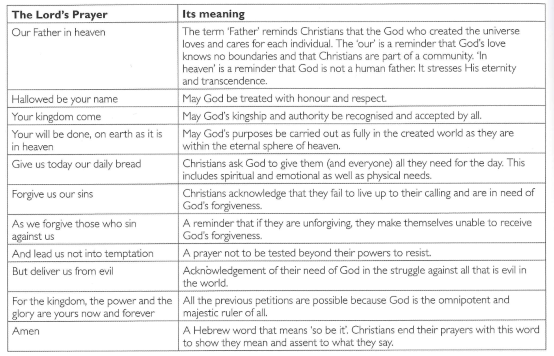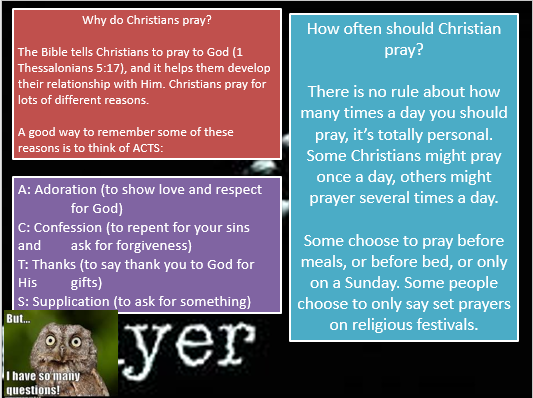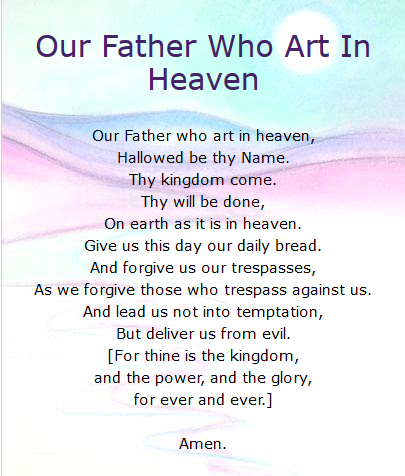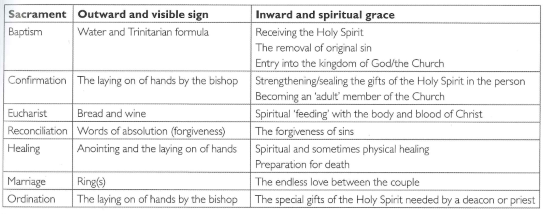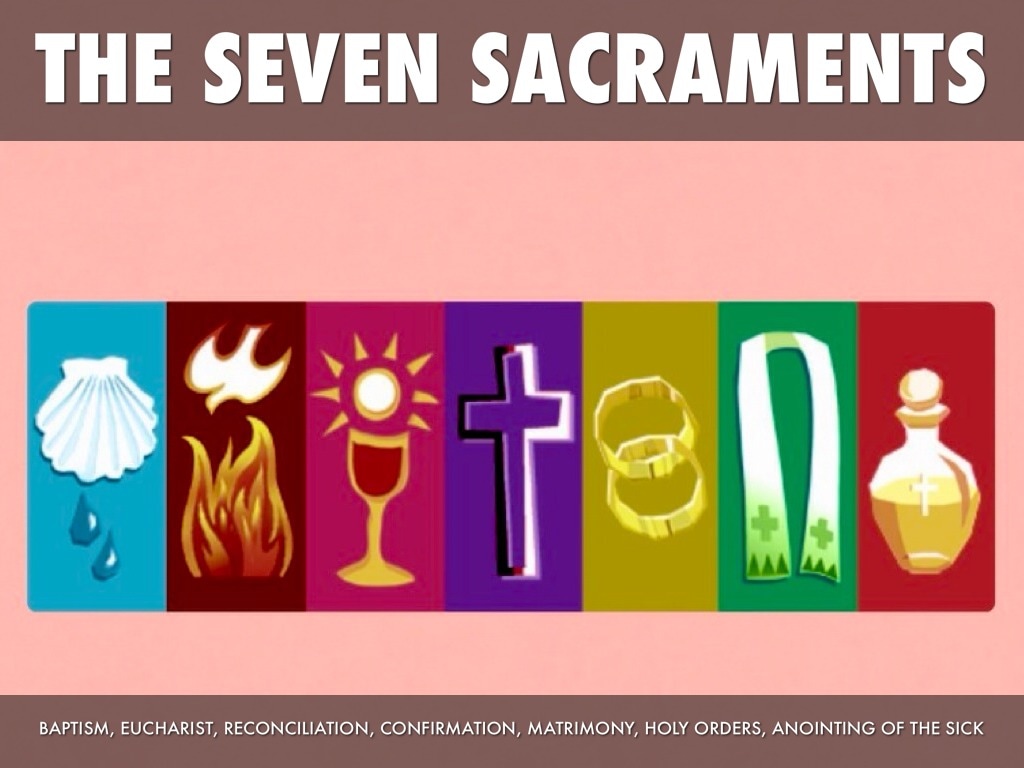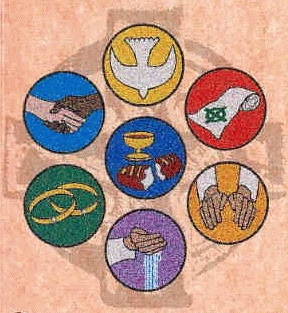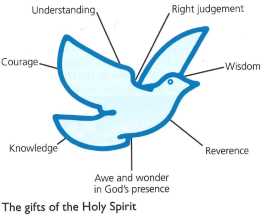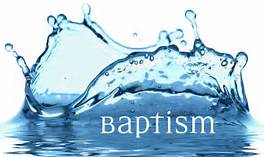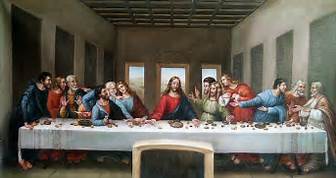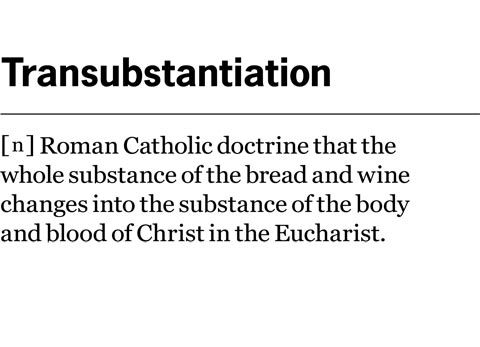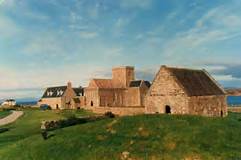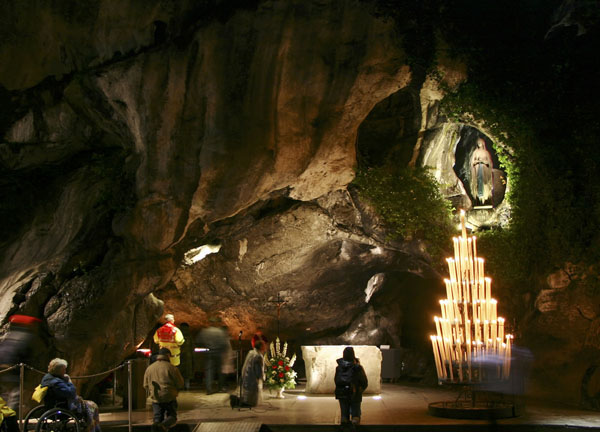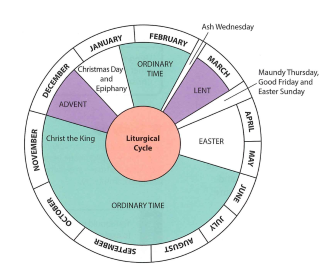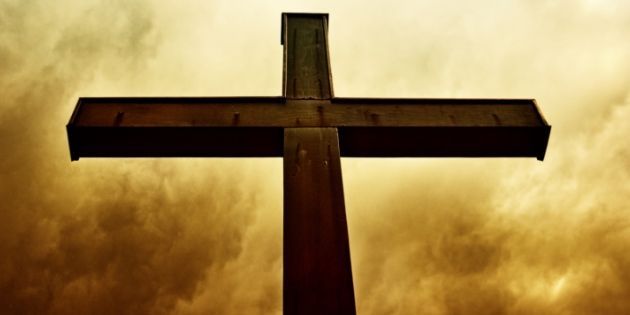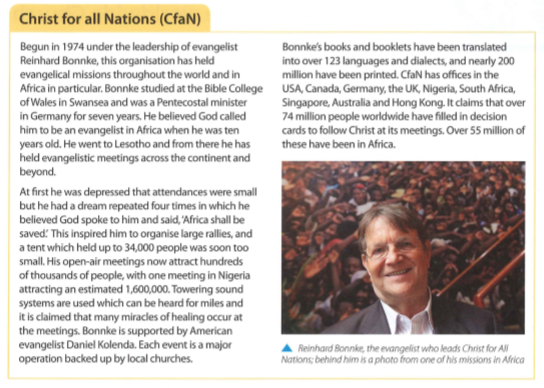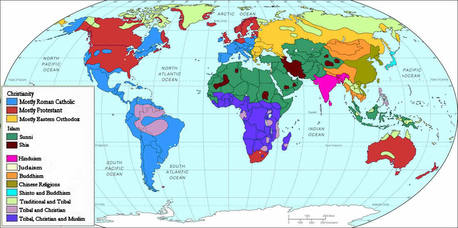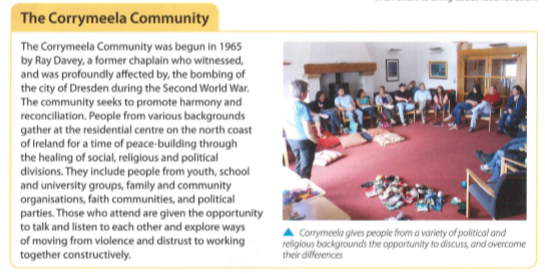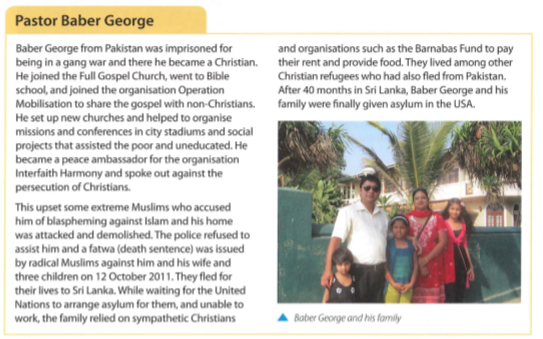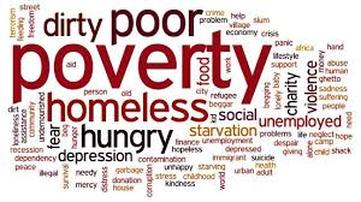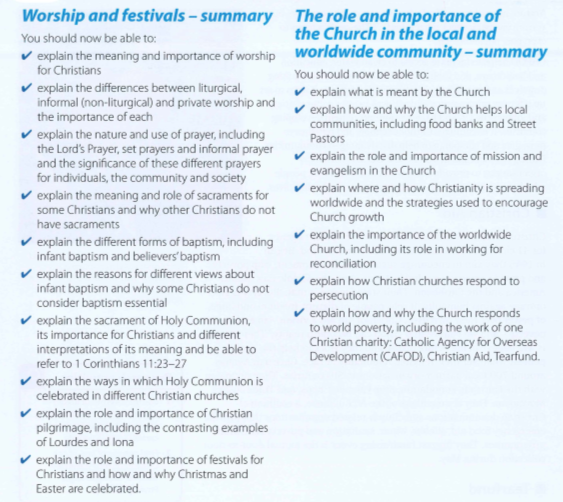Lesson One: Forms of Worship
|
In Christianity there are four main forms of worship.
Liturgical Worship - This is a kind of worship which follows a set pattern or order. There is no improvisation at all and it mainly takes place in a church setting. Non-liturgical Worship - This is a more informal style of worship in which the service leader will have the free choice to move away from structure. Informal - Informal worship can occur anywhere and with any number of people. It may involve the Bible or other religious texts. Some informal worship even involves singing and dancing! Private Worship - Private worship can take place just about anywhere and may be liturgical or non-liturgical in style. Worshipping alone allows Christians to feel close to and at one with God. Ways in which Christians can privately worship are:
|
‘’For where two or three gather in my name, there am I with them’
Matthew 18:20 |
Lesson Two: Prayer
|
Prayer is communicating with God in silence or aloud, with others or alone, using set prayers or informal prayer. Sometimes Christians say a set prayer before eating a meal to thank God for providing what they need to live. Other Christians might pray spontaneously for their meal using their own words, in an informal prayer.
People may pray in a humble position, kneeling down, sometimes with hands pressed together. In Orthodox services people stand to pray, Nonconformists often sit, Anglicans may kneel, and other Christians raise their hands to invite the Holy Spirit into their lives. Catholics may use a rosary, while Orthodox Christians use icons to aid prayer. Set prayers
Set prayers form a key part of liturgical worship, But many Christians also use them for private prayer. Many were written by great thinkers, literary figures and above all, deeply religious men and women. Some come from the Bible, such as the prayer from 2 Corinthians 13:14 it is often said in both public and private worship. The simpleest of all set prayers is the Jesus Prayer which says "Lord Jesus Christ Son of God, have mercy on me, a sinner" It is an Eastern Orthodox Prayer which dates back to 4th Century, but it has become popular with Christians in other denominations as it is so simple, yet so profound. Informal prayer
In public worship, this takes the form of extemporary prayer. Most Christians use their own words at least some of the time in their private prayes. Many prefer informal prayer to set prayers as they seem to come more directly from the heart, meeting their particular concerns. One type of informal prayer is known as the arrow prayer. These are very short prayers addressed to God spontaneously at a time of urgent need or in response to a particular situation. In a time of personal crisis a Christian might pray 'Help me God' or respond to getting through the crisis with 'Thank you God'.
|
This Prayer is especially important for Christians, as it was the prayer that Jesus himself taught his disciples when they asked him how they should pray. It contains some of the key aspects of prayer: praise, confession, prayer for others and for oneself.
|
Lesson Three: The Sacraments
|
The term 'sacrament' has been defined as 'the external and visible sign of an inward and spiritual grace.' They are things that people do/experience through their five senses (taste, smell, touch, hear, see). They are acts which highlight people as being Christian as well as bring them closer to God. In some cases, these sacraments involve God imparting some gift or power and in others they just involve Christians doing the things which are seen to be central to their faith.
The Protestant traditions generally acknowledge only the two sacraments of baptism and the Eucharist. They are known as Gospel sacraments because they were authorised by Jesus and there are many references to their use in the books of the New Testament Roman Catholics, Orthodox Christians and some Anglicans recognise seven sacraments. They believe that they are all implied by the ministry of Jesus as recorded in the Gospels and the practice of the Early Church described in the rest of the New Testament. These seven sacraments are Baptism Confirmation (Christmation in the Orthodox Church) Eucharist Reconciliation (sometimes refered to as confession) Healing Marriage Ordination (becoming a priest) Roman Catholics refer to the sacraments of Baptism, Confirmation and the Eucharist as the three rites of initiation |
Lesson Four: Baptism
|
Baptism was a ritual that the Jew’s of Jesus’ day practiced to be cleansed from impurity. However, when John the Baptist baptised people it was about being forgiven for sins.
Jesus was baptised by St John the Baptist who was his cousin. John didn’t want to baptise Jesus as he said he was far less important and significant than him. However, Jesus wanted to be baptised in this way to show that he agreed and saw value in the practice. When Jesus was immersed fully into water and praised by John, the holy spirit entered his life and he felt reassured that he truly was the Son of God. Just before Jesus ascended to heaven, 40 days after his resurrection, he said to his disciples that they should: ‘Go make disciples of all nations, baptising them in the name of the Father and of the Son and of the Holy Spirit’. Baptism was a rite of initiation into the Christian community right from the start and there are many references to Baptism throughout the New Testament. |
Baptism is a Gospel sacrament practised by almost all Christian Churches (although in different forms), so it could be considered the most important of all sacraments. The structure of the baptism service varies in the different denominations, but all use water and the Trinitarian formula: "I baptise you in the name of the Father and of the Son and of the Holy Spirit. Amen."
Baptism is important to Christians for many reasons:
|
Easter Homework
Find out how people become members of the Quakers or Salvation Army and why they do not accept sacraments.
Write a paragraph on each.
Due Monday 24th April. (First Monday back).
Useful Websites
http://www.bbc.co.uk/religion (search for Quakers)
http://www.firstfriendswhittier.org/welcome/sacraments.html (more detailed)
http://www.waterbeachsalvationarmy.org.uk/what-to-know-more/why-does-the-salvation-army-not-baptise-or-hold-communion/
Lesson Five: Eucharist
|
The last supper was Jesus' last meal with his disciples before he died. It was a passover meal which celebrated the escape from slavery in egypt of moses and his fellow israelites. What Jesus said and did gave this meal a new significance. Paul, in a letter to the Christians in Corinth, described how in the course of the Last Supper Jesus 'took bread, and when he had given thanks, he broke it and said "This is my body, which is given for you: do this in rememberance of me." In the same way, after supper he took the cup, saying, "This cup is the new covenant in my blood; do this, whenever you drink it, in rememberance of me"
Jesus linked the bread and wine to his imminent death, and it was a sign of the new covenant (relationship) established by his death between God and all believers. The Eucharist is celebrated by almost all Christian denominations (though not by Quakers and the Salvation Army). It has many names such as the Lord's Supper, the Breaking of the Bread, the Liturgy, Holy Communion, Nass. The central features are the same: the connection with the Last Supper, the giving of thanks for the bread and wine (consecration) ans using Jesus' words at the Last Supper. The consecrated bread and wine are then shared among the congregation. However, the structure of the service and the interpretation of its meaning differ considerably between the Christian denominations. So, for example, Roman Catholics believe the bread and wine become the actual body and blood of Christ (transubstantiation) whereas Protestants do not believe this. Many Protestants see the ceremony as an expression of faith and obedience, whereas the Catholic, Orthodox and Anglican traditions see it as a way to recieve God's grace. Not all denominations use wine, many of the Non-Conformist churches use a non-alcoholic substitute. The Catholic Mass
Mass begins with a greeting from the priest, and prayers of penance and praise (the 'Gloria'). Liturgy of the Word • On Sundays there are three readings from the Bible (from the Old Testament, Paul's letters and the Gospel), a psalm and a homily . • People say prayers for the Church, the world, the local community, the sick and the dead. On Sundays this is preceded by the Creed. Liturgy of the Eucharist • Offerings of bread and wine are brought to the altar. • The priest says the Eucharistic Prayer using the words of Jesus at the Last Supper: 'He gave you thanks, he broke it [the bread], gave it to his disciples, saying: Take, eat: this is my body which is given for you in remembrance of me.' • He prays over the wine using similar words. • The people say the Lord's Prayer. • The priest and congregation give a sign of peace to each other. • Members of the congregation come forward to receive communion. • The priest blesses the people and tells them, for example, 'Go in peace, glorifying the Lord by your lives.' Extension question: How do these services emphasise equality and community?
Relevant teachings
"The Lord Jesus, on the night he was betrayed, took bread, and when he had given thanks, he broke it and said,'This is my body, which is for you; do this in remembrance of me: In the same way, after supper he took the cup, saying,' This cup is the new covenant in my blood; do this, whenever you drink it, in remembrance of me: For whenever you eat this bread and drink this cup, you proclaim the Lord's death" until he comes. '' 7 Corinthians 7 7 :23-26 |
An Orthodox Divine Liturgy.
In the Orthodox Church, the Eucharist is known as the Divine Liturgy. The Divine Liturgy recreates heaven on earth. Much of the service takes place on the altar in the sanctuary behind a screen, called an iconostasis, which represents the divide between earth and heaven. The priest passes through the iconostasis using the Royal Doors. The church is filled with candles and incense that help people feel God's presence. Liturgy of the Word • There are hymns, prayers and a reading from the Bible. • The priest comes through the Royal Doors to chant the Gospel. • There may be a sermon. Liturgy of the Faithful • The priest comes through the Royal Doors to receive wine and bread baked by members of the congregation. He selects one loaf to be consecrated. • The Creed, the Lord's Prayer and other prayers are offered for the church, the world, and the local community. • Behind closed Royal Doors, the priest says the words Jesus said at the Last Supper. • The bread is divided in four: three parts are consecrated as the body and blood of Christ. The fourth unconsecrated part is broken into small pieces. • The priest comes through the Royal Doors to distribute the consecrated bread and wine together on a spoon to the people who come forward for communion. • Prayers of thanksgiving are said after communion. • As people leave, the priest gives them pieces of the unconsecrated bread to take home as a sign of being part of the Christian community. Holy Communion in the Anglican Church
A Communion service in the Church of England is almost identical to that of the Catholic Church. One small difference is that the 'peace' ('sign of peace' in the Catholic Mass) is shared at a different point in the service; whereas Catholics do this after the Lord's Prayer, Anglicans do it before the offerings of bread and wine are brought to the altar. Some Anglicans share the Catholic and Orthodox view that the bread and wine are transformed into Christ's body and blood, but many believe that Jesus is present in the bread and wine in a spiritual way and only while it is being eaten. The main emphasis is on this community meal being shared equally with all. Holy Communion in Nonconformist churches A typical service in the United Reformed Church has these elements: • It begins with a hymn and a prayer of praise and thanksgiving. • Bible readings and a sermon follow. • The congregation prays for the world and for the needs of particular people. • The minister reminds the congregation of Jesus' words and actions at the Last Supper. He or she takes bread and wine, says a prayer of thanksgiving over them, including the words of Jesus, 'This is my body' and 'This is my blood'. • There is an 'open table' so anyone who wishes to take communion may receive the bread and wine. • People may come forward to receive the bread and wine. In some places the bread is cut beforehand, in others people break a piece off as it is passed around the seated congregation. The wine is sometimes non-alcoholic and is usually distributed in small cups. • There is a prayer of thanksgiving, blessing and an encouragement to go out and serve God. |
Lesson Six: Pilgrimage
|
pilgrimage: a journey by a believer to a holy site for religious reasons; pilgrimage is itself an act of worship and devotion.
Christians go on pilgrimage to: • grow closer to God and strengthen their faith • express sorrow for sin and be forgiven • reflect on their lives, particularly when facing a crisis or a big decision • pray for something special or thank God for a blessing • seek a cure for an illness • help other pilgrims who are disabled or ill • experience a holy place • meet others who share their faith It is not compulsory for Christians to go on a pilgrimage but it can play an important role in their spiritual lives. Often they come back with a better understanding of their faith and renewed enthusiasm for living a Christian life. They may have received advice from priests or monks that has helped them see problems in a new light. They may also feel cleansed from sin. Lourdes Lourdes in south-west France is a place of pilgrimage dedicated to Mary, the mother of Jesus. In 1858 a young girl named Bernadette had visions of Mary in a grotto (cave) near the river. Bernadette spoke of praying the rosary with Mary who looked lovingly upon her. Mary told Bernadette to dig for a spring of water, which was discovered to have healing properties. Now thousands of pilgrims visit Lourdes to pray at the grotto where Mary appeared, to recite the rosary together, and to bathe in the water where it is claimed that 6 7 miracles and over 6000 other cures have taken place. Many of these pilgrims are sick or disabled and are accompanied by able-bodied helpers. |
'' As I raised my head to look at the grotto, I saw a Lady dressed in white, wearing a white dress, a blue girdle and a yellow rose on each foot, the same color as the chain of her rosary; the beads of the rosary were white. '' Bernadette describing her first vision of the Virgin Mary.
Iona
Iona is an island off the west coast of Scotland. In the 6th century AD, St Columba, an Irish missionary who brought Christianity to Scotland, established a small monastic community there. It is now the home of the ecumenical Iona Community and a place of Christian pilgrimage dedicated to the Virgin Mary. Some people think Iona is a 'thin place', where the veil between the spiritual world and the physical world is thin. Iona is remote and windswept, so for many pilgrims it feels like a place where nature reveals God's infinite power and presence. The Iona Community hold daily services in the abbey church, lead a seven-mile hike to the island's holy and historic spots, and conduct workshops on Christian themes. Pilgrims are asked to help out with daily chores and meals while staying there. There is time for silence, for reflection or meditation, for reading the Bible or holy books, and for enjoying the area's natural beauty. |
Lesson Seven: Festivals (Easter and Christmas)
|
EFestivals have an important role in helping Christians remember the major events in their religion and to plan their public worship. Many Christians celebrate the same cycle of festivals each year. The Christian calendar has two main seasons: Advent, Christmas and Epiphany; Lent, Easter and Pentecost. By living through the events of Jesus' life, death and resurrection and the coming of the Holy Spirit at Pentecost, Christians remember the central teaching of their faith- that God gave his only Son to save them.
Christmas Christmas commemorates the Incarnation of Jesus, the belief that God became human in Jesus. In Great Britain, Christmas is celebrated on 25 December. The celebrations last 12 days ending with the feast of the Epiphany. Trees and homes are decorated with lights and nativity scenes. Lights represent Jesus as the light coming into the world of darkness and nativity scenes show the baby Jesus being born in poverty. Many churches have carol services with readings from the Bible showing God's promise of a saviour and the events of Jesus' birth. Children act out nativity plays, and Midnight Mass takes place on Christmas Eve. Christians send Christmas cards and exchange gifts which recall the wise men's gifts to Jesus. It is seen as a time of 'peace and goodwill' when Christians give to charity as God gave the gift of Jesus, his Son. Easter Easter is the most important Christian festival. It celebrates the resurrection of Jesus from the dead. During the week leading up to Easter (Holy Week) Christians remember the events that led to the sacrifice of Jesus on the cross. Jesus was crucified on 'Good Friday' and laid in the tomb. Special services are held and processions in the streets are led by a person carrying a wooden cross. On Easter Sunday (Easter Day) the churches are filled with flowers and special hymns are sung celebrating the resurrection. Orthodox Christians walk around the church at midnight on Saturday and then enter the darkened church with lighted candles or lamps. This symbolises entering the empty tomb. The priest announces 'Christ is risen!' and the congregation answers 'He is risen indeed'. Catholics and Anglicans also have a Saturday night vigil that begins in darkness, includes the lighting of a large Paschal candle to symbolise the risen Christ, and ends with Holy Communion. Many churches organise open-air sunrise services and share breakfast together, usually eating eggs, a symbol of new life. |
"Father, you make this holy night radiant with the splendour of Jesus Christ our light. We welcome him as Lord, the true light of the world. Bring us to eternal joy in the kingdom of heaven, where he lives and reigns with you and the Holy Spirit, one God, for ever and eve" - Opening prayer of the Catholic Midnight Mass at Christmas
"Christ is risen from the dead, trampling down death by death, and upon those in the tombs bestowing life. '' - Traditional hymn sung by Orthodox Christians at the Easter Divine Liturgy
|
Christmas " RE:quest
Christmas is probably the most popular of all Christian festivals. From the beginning of September shops and restaurants are getting ready for the 'Christmas rush.' Most schools will put on Christmas plays, in towns Christmas lights decorate the streets and Christmas trees can be seen everywhere.
Lesson Eight: Food banks and Street Pastors
|
If asked to define the word 'church', many answer that the church is where Christians worship. This is correct but it is not the sense in which the word 'church' is used in the Bible. The word 'church' comes from the Greek word 'ekklesia' which is defined as an assembly, or a gathering of Christian people. The root meaning of 'church' is not that of a building, but of people. Originally the early Church did not have a special building and Christians met together in people's homes. The New Testament explains that the Church consists of a group of believers under the leadership of Jesus. First and foremost the Church is made up of the followers of Jesus in the local community.
'' And God placed all things under his (Jesus') feet and appointed him to be head over everything for the church, which is his body. '' - Ephesians 1:22-23 The church as a building provides a location where Christians from the local community can meet, worship, pray, obtain spiritual guidance and socialise. Often events take place on weekdays as well as worship on the Christian holy day of Sunday. Some activities are specifically for Christians such as prayer meetings or Bible studies; others fulfil a need in the local community, for example a mothers' and toddlers' group or youth club. The role of the Church is not confined to the building. Throughout its history the Church has been a major source of social services like schooling and medical care, it has been an inspiration for art and culture and it has campaigned for justice and championed the neglected. In modern Britain the Church has become involved in projects that help the local community, such as food banks. This work fits with Christian teachings to act with compassion to those in need The Oasis Project
The Oasis Project of the Plymouth Methodist Mission Circuit is a community hub with an internet cafe, creative courses, a job club, training opportunities and a base for meetings. It also runs a food bank. Paid staff are supported by volunteers and session tutors. Around 200 people use the centre each week and spiritual and practical support is given to those who need it because of ill health, learning disability, domestic violence, substance abuse, low income and housing problems.
|
"For I was hungry and you gave me something to eat, I was thirsty and you gave me something to drink, I was a stranger and you invited me in, I needed clothes and you clothed me, I was sick and you looked after me, I was in prison and you came to visit me." - Matthew 25:35-36
The Trussell Trust
Founded in 1997 by Carol and Paddy Henderson, the Trussell Trust food banks provide emergency food, help and support to people in crisis in the UK. Based on Christian principles, shown, for example, in the parable of the Sheep and Goats, the aim is to bring people together (religious and non-religious) to work towards ending poverty and hunger in Britain. Rising prices, cuts in welfare benefits, redundancy, family breakdown, and unexpected expense may all contribute to an emergency situation. Non-perishable food is donated to the food banks by churches, supermarkets, schools, businesses and individuals and is sorted by volunteers, including making sure that it is within date. Care professionals such as doctors, health visitors and social workers identify people in crisis and issue a food voucher. In exchange for their food voucher, three days of nutritionally balanced food is provided. Some of the food banks provide courses designed to help |
|
Street Pastors
The teaching of Jesus, for example in the parable of Sheep and the Goats (Matthew 25:31-46), shows that Christians should not ignore the needs of society because showing agape love is part of the Christian way of life. Churches should respond practically to the needs of their local communities. These needs vary; for example, they might include a lack of facilities for young people, insufficient care for the vulnerable, the problem of gang culture or people feeling frightened on the streets. Churches have tried to meet these challenges with local projects such as Street Pastors. Rev. Les Isaac started the interdenominational network of Street Pastors in Brixton, south London, in 2003 with 18 volunteers. It was an initiative of Ascension Trust, a Christian charity, where Christian adult volunteers receive training in order to patrol the streets in urban areas. They do not have the power to enforce the law but provide a reassuring presence in local communities. Initially the main aim was to challenge gang culture and the use of knives and guns in some areas of London. As Christians elsewhere began their own groups, the focus widened to include responding to drunkenness, anti-social behaviour and fear of crime. Street Pastors aim to help and care for vulnerable people in practical ways, working closely with councils and the police in their local communities. Wearing a blue, reflective 'Street Pastor' uniform, their aim is not to actively preach but to provide a positive service to their local areas. Their work includes listening to people's problems, giving guidance regarding agencies which might be able to help and discouraging anti-social behaviour. They are backed up by prayer partners (Prayer Pastors) who pray for the Street Pastors and the work they are doing. Sometimes they communicate with each other via mobile phones. Since 2003 Street Pastors has grown rapidly and they now operate in nearly 300 locations worldwide with around 14,000 trained personnel. A sister organisation, called School Pastors, was set up in 2011 with the aim of reducing anti-social behaviour, illegal drug use and bullying. Within school, School Pastors mentor young people and they patrol within and around schools to help prevent behaviour problems. There recently has been the development of College Pastors, Rail Pastors, and (in the event of a disaster) Response Pastors. The mission of the Church includes trying to make a positive contribution to the local community and being a good neighbour. This idea is summed up in James 2:14-17. This has resulted in organisations such as the Neighbourhood Prayer Network, the Boys' and Girls' Brigades, the YMCA, and projects designed to help people's physical well-being such as Parish Nursing. |
Parish Nursing
Parish Nursing Ministries UK is a Christian charity which supports whole person healthcare through the local church. In Walton Parish, Felixstowe, three churches partner a project that provides registered parish nurses to promote well-being in body, mind and spirit. Their work includes diagnosing early signs of health problems, training and coordinating volunteers to help alleviate loneliness or provide support during times of crisis, and giving additional help to the NHS. They encourage healthy living through exercise and a healthy diet, and provide education and health advice. Their focus is on the person rather than just their medical condition, and they will listen to problems, give reassurance, pray with them if asked and direct them to specific services if required. .. |
Lesson Nine: Mission and Evangelism
|
The Church not only provides a place to worship and learn about God, it also has a mission to spread the good news to non-believers that Jesus Christ is the Son of God and came into the world to be its saviour. Matthew's gospel ends with what is known as the Great Commission: These were some of the last words that Jesus gave to his disciples and they sum up the mission of the Church: Christians are not only called to know Jesus in their lives but also to make him known to others. In Matthew's account of the call of the first disciples, Jesus says to Simon Peter and Andrew: 'Come, follow me[ ... ] and I will send you out to fish for people.' (Matthew 4: 19). When the early disciples received the Holy Spirit at Pentecost, ten days after Jesus ascended into heaven, this gave them the gifts necessary to carry out the Great Commission (1 Corinthians 12:4-10).
Christians have the responsibility, according to the Great Commission, to tell others of their faith. This may be spreading the word to people they meet in everyday life or, for some, through organised events or preaching. Others may feel called to go to other countries and become missionaries, which involves evangelism and in some cases humanitarian work among the poor and disadvantaged. The main aim is to persuade people to accept Jesus as their Lord and Saviour (see Romans 10: 9-10) and to extend the Church to every nation of the world. The New Testament book, the Acts of the Apostles, explains how the early Christian Church grew in this way and includes, for example, the missionary journeys of the apostle Paul. |
Relevant Teachings
The Great Commission “Therefore go and make disciples of all nations, baptising them in the name of the Father and of the Son and of the Holy Spirit, and teaching them to obey everything I have commanded you” Matthew 28:19-20 The Alpha Course
Originally known as the Alpha Course, Alpha was started in 1977 by a Church of England curate, Reverend Charles Marnham, at Holy Trinity, Brompton, London. The aim was to help church members understand the basics of the Christian faith but soon it began to be used as an introduction for those interested in learning about Christianity. The organisers described this evangelistic course as 'an opportunity to explore the meaning of life' through a series of talks and discussions. The idea caught on and many of the major Christian denominations in Britain and abroad began using it. In the 1990s the Reverend Nicky Gumbel from Holy Trinity, Brompton was involved in revising the course and encouraging its use. Alpha courses take place not only on church premises but also in peoples' homes, universities, workplaces, prisons and other venues. Worldwide, millions of people have taken part in this course and other related courses have been started. These include relationship and marriage courses for adults and study programmes for young people. |
Lesson Ten: Church Growth
|
It is difficult to know how many Christians there are in the world. Estimates vary from 1.5 to 2.5 billion. Up to a third of the world's population claim some sort of Christian faith. This figure includes people who may know little of the Christian faith and rarely attend church but in a census declare themselves as Christian. The Church has grown rapidly from the time of Ghrist and is still doing so in South America, Africa and Asia. This is not the case in the USA and Europe, despite Church growth programmes, or in the Middle East where Christians have suffered much persecution.
In 2010 there were nearly 1.1 billion Catholics, a big increase on the estimated 291 million in 1910. Despite opposition from the communist government, it is estimated that in China there will soon be more Christians than in any other country of the world. In 1900 there were no Protestant churches in South Korea, now the capital city of Seoul alone has 7000 with the Yoido Full Gospel Church reporting that it has a million members. It is estimated that churches in Africa are increasing by an average of 34,000 people per day. Worldwide, something like 80,000 people become Christians each day, and over 500 new churches are formed. |
Discipleship
The Church's mission of sharing Christ does not end with people deciding to become Christians. The Great Commission as described by Jesus was to make disciples, not just new believers. So the Christian mission involves not only evangelism but also the training of new converts in the way of following Jesus. For this purpose each individual Christian has a part to play in spreading the faith and encouraging fellow believers. This can be done by sharing testimonies (describing what God has done in their lives), inviting people to Christian meetings, prayer, advertising, using the media (Premier Christian Radio, God TV, Face book, Twitter, newspapers and magazines), fellowship meals, and social events. |
Lesson Eleven: The importance of the worldwide church.
|
Reconciliation
The primary mission of the worldwide Church is to proclaim that Jesus came so that the relationship between God and people can be restored. Christians argue that sin caused this relationship to be broken and separated the world from God who is holy. Romans 5: 10 says that people have become enemies of God, but the message of the Church is that Jesus came to change that. Christians believe that when Jesus died on the cross and rose again he saved human beings from sin, and through his grace made it possible for 'God's enemies' - humankind-to be forgiven and become his friends. One of the seven sacraments in the Catholic Church is called the sacrament of Penance and Reconciliation, and is a response to 2 Corinthians 5:18-19. Matthew 5:23-24 states that Christians are not only to be reconciled to God but should be reconciled to one another. So the worldwide Church has a role to restore people's relationship with God and with one another. From news bulletins it is clear that there is much disharmony and hatred in the world resulting in violence and bloodshed. Even sections within the Church have fallen out and fought each other, for example in Northern Ireland there has been conflict between Catholics and Protestants. Recently the Irish Churches Peace Project (ICPP) was set up to bring together Christians from all over Northern Ireland to discuss initiatives to develop peace and understanding. In 1940, during the Second World War Coventry Cathedral was bombed. Local Christians were determined not to get revenge but to show forgiveness to those who were responsible. The cathedral has since become a world centre for reconciliation. The Community of the Cross of Nails at Coventry Cathedral works with partners in many countries with the aim of bringing about peace and harmony. |
Persecution
Despite the work of Christians to bring reconciliation and peace, the International Society for Human Rights, claims that 80 per cent of all acts of religious discrimination in the world today are directed at Christians. The Pew Research centre reported that, in 2012, Christians were discriminated against in 139 countries- almost 75 per cent of the world's nations. The persecution ranges from forcing Christians to pay an extra tax, not allowing them to have good jobs or build churches to attacks on their homes, churches and family, and even murder. It is believed that many thousands of Christians are killed each year because of their faith. In 2015 it was reported that the ten countries where the most serious persecution was taking place are North Korea, Somalia, Iraq, Syria, Afghanistan, Sudan, Iran, Pakistan, Eritrea and Nigeria. Christians have faced persecution throughout the history of the Church. The apostle Paul warned that 'everyone who wants to live a godly life in Christ Jesus will be persecuted' (2 Timothy 3: 12). Jesus told Christians to expect persecution from the world because if they persecuted him, they would persecute his followers too (John 15:18-19). The World Council of Churches has a programme to try and bring about reconciliation between Christians of different denominations and members of other faiths. For example, in the Pilgrimage of Justice and Peace initiative, they seek to work together to help heal a world filled with conflict, injustice and pain. This includes supporting member churches, inter-religious dialogue and cooperation in attempting to build a just community for all. |
Lesson Twelve: Christian Persecution
|
Jesus said:'' Blessed are those who are persecuted because of righteousness, for theirs is the kingdom of heaven. Blessed are you when people insult you, persecute you and falsely say all kinds of evil against you because of me. Rejoice and be glad, because great is your reward in heaven. '' Matthew 5:7 0-7 2 [NIV].
How do Christian churches respond to persecution? Not all persecution has a totally negative effect. It may also help Christians to develop their faith and strengthen their convictions as believers. When their beliefs are challenged Christians have to decide whether or not to be fully committed to the faith (see James 1 :2-4). Christians believe that those who suffer for their beliefs share in a unique way with Jesus: 'I want to know Christ-yes, to know the power of his resurrection and participation in his sufferings' (Philippians 3: 10) The second-century Church Father Tertullian wrote that 'the blood of martyrs is the seed of the Church'. He was claiming that the Church grows because of persecution because people witness the calm assurance and hope of eternal life that Christians have. Whether faced with verbal or physical abuse, Christians are still encouraged to show love: 'Do not be overcome by evil, but overcome evil with good.' (Romans 12:21) Jesus said, 'If someone slaps you on the right cheek, turn to them the other cheek also.' (Matthew 5:39)
|
Supporting the persecuted
In Corinthians, Paul likens members of the Church to different parts of the body and says, 'If one part suffers, every part suffers with it' (1 Corinthians 12:26). So the Church campaigns on behalf of persecuted Christians and supports them where possible. For example, during the Communist persecutions in Eastern Europe, Christians like Brother Andrew, Daniel Scalf and David Hathaway smuggled Bibles into the USSR (Russia) to help strengthen the Christians there. The Barnabas Fund The Barnabas Fund sends financial support to projects that help Christians who are suffering from discrimination, oppression and persecution because of their faith. These projects aim to strengthen Christian individuals, churches and their communities by providing material and spiritual support. One of their aims is to raise awareness of the plight of those who are persecuted. Christian Solidarity Worldwide (CSW) CSW is a Christian human rights organisation that campaigns for religious freedom for all. It uses four main strategies: 1. Documenting and raising awareness of religious persecution. 2. Attempting to influence governments whose policies or actions affect the oppressed. 3. Offering training in the basics of international human rights' law. 4. Helping the oppressed to speak up for themselves more effectively. |
Lesson Thirteen: The Churches response to world poverty.
|
Why should Christians respond to world poverty?
Many Christian charities follow the teaching and example of Jesus in working to relieve poverty. Jesus told a rich man to sell everything and give to the poor (Mark 10:21). In the parable of the Rich Man and Lazarus, Jesus told of a rich man who ended up in hell having ignored the plight of a beggar (Luke 16:19-31). The parable of the Good Samaritan teaches the importance of caring for all people. Jesus helped outcasts such as lepers, tax collectors, sinners and the mentally ill. Christians believe they should present Jesus to the world through helping the disadvantaged. The passage from 1 John 3:17-18 says: '' If anyone has material possessions and sees a brother or sister in need but has no pity on them, how can the love of God be in that person? Dear children, let us not love with words or speech but with actions and in truth. '' 1 John 3:17-78 [NIV] |
|
|
|
